Is Winnipeg safe? How residents feel, according to a CTV News poll
The sense of safety is slipping for many Winnipeggers, with a majority of residents saying they feel their neighbourhood safety has decreased in recent years. One community advocate says crime has become more visible and is calling on citizens to help address the root causes.
The safety concerns are revealed in a new Probe Research poll, commissioned by CTV News Winnipeg and the Winnipeg Free Press.
More than half of the respondents (51 per cent) told Probe Research they feel less safe in their own neighbourhoods than they did three years ago. Residents living in the city's core and northwest areas were more likely to feel their areas are less safe.
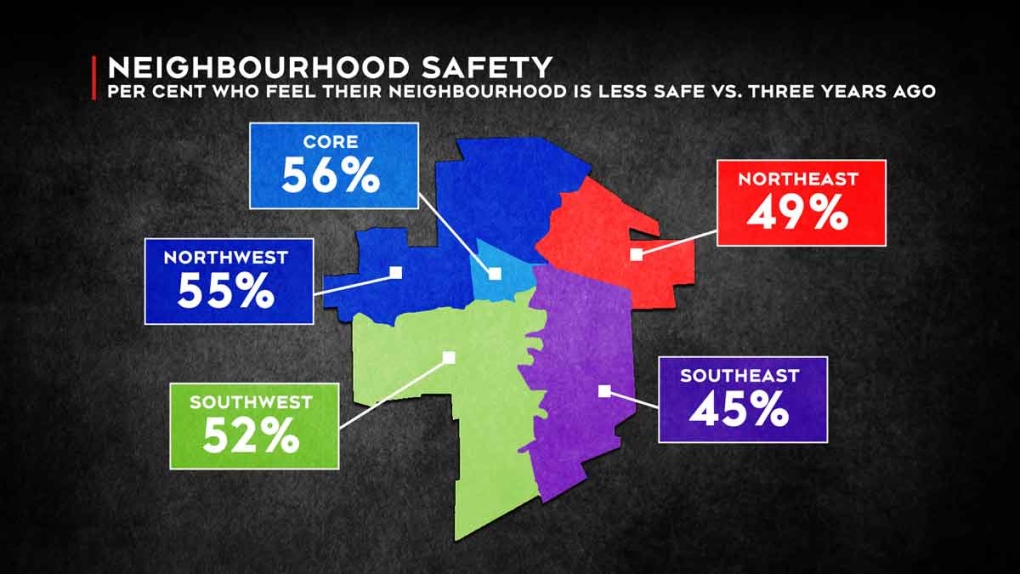
Only about six per cent of Winnipeggers feel their neighbourhoods have become safer.
The slipping sense of safety is not confined to neighbourhoods. The polling finds nearly eight in 10 Winnipeggers feel the city overall is less safe than it was three years ago.
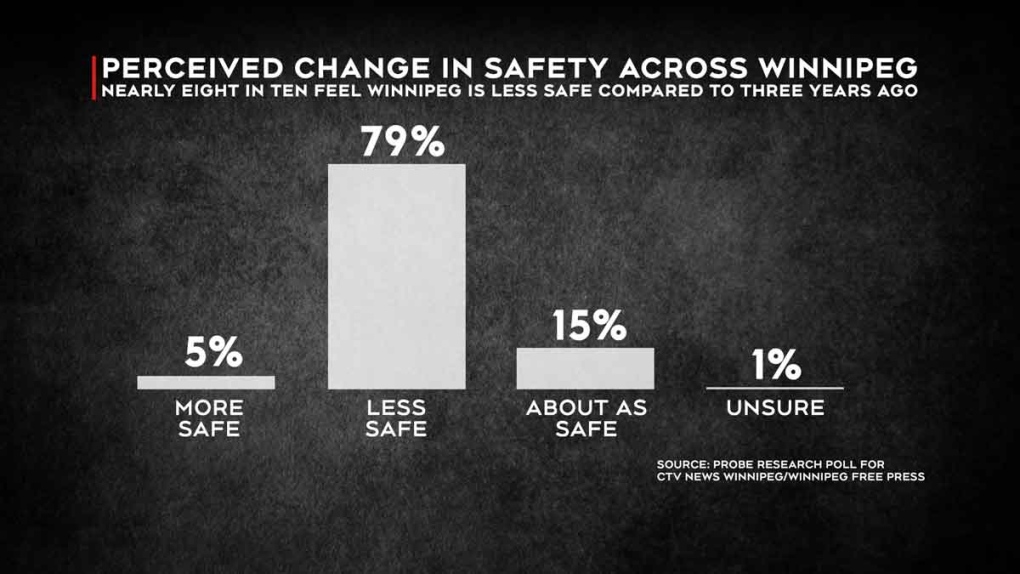
Those over the age of 55 were more likely than other age groups to feel the city has become less safe over time; 87 per cent of respondents in that age group said Winnipeg is a lot or a little less safe.
Homeowners were also more likely to believe the city is less safe (83 per cent) compared to renters (69 per cent).
PANDEMIC SHONE A LIGHT ON ISSUES
Mitch Bourbonniere, a community outreach worker with the Downtown Community Safety Partnership, says he believes the issues facing the city have become much more visible during the COVID-19 pandemic.
"It shone a lot of light on the need of our most vulnerable in our city," he said. "I just think every city right now in the world is having challenges serving their most vulnerable members of their society. And we're no different here in Winnipeg."
He said while the perception of safety for Winnipeggers may be dropping, anyone can play a role in changing that.
"It's incumbent upon us to get together to address these concerns and address them in a root cause global manner where we are looking at poverty, we are looking at mental health, addictions, all of that," he said. "That in itself will have an impact on our safety and on the crime rate."
He pointed to the work of groups including the Bear Clan, the Mama Bear Clan, the Thunderbirds, Community 204, OPK, as well as a new program in Osborne Village called the Sabe Peace Walkers.
"We've got at least a dozen strong citizen-led grassroots volunteer programs," he said. "I think the more we can get out here and add vibrancy to our city, the safer it's going to get."
FOUR IN 10 SAY THEY HAVE BEEN VICTIMS OF A CRIME
For many of the respondents, the safety concerns hit close to home. Four in 10 Winnipeggers reported being the victim of a crime at some point in the past three years.
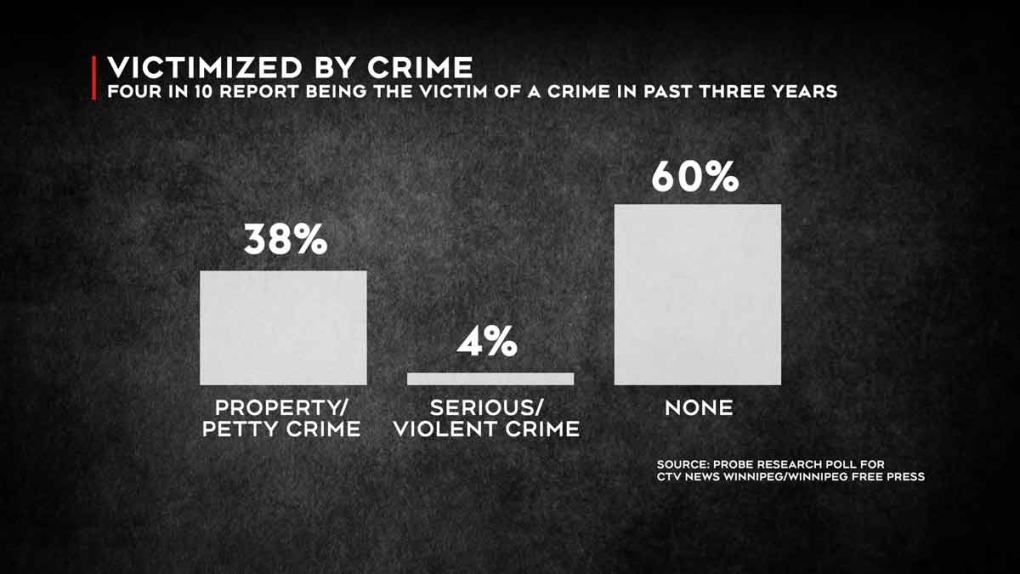
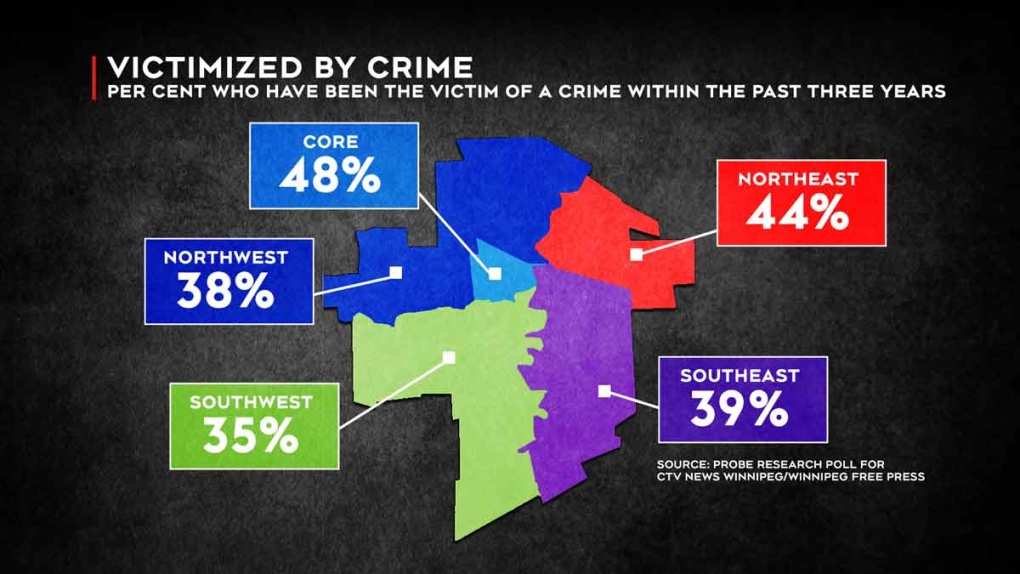
Winnipeggers living in the city's core were more likely to say they were victimized by crime in the last three years, compared to other parts of the city.
Those between the ages of 18-34, those who make more than $100,000, those with a high school education or less, and those who have children at home were also more likely to indicate they were a victim of a crime in the past three years.
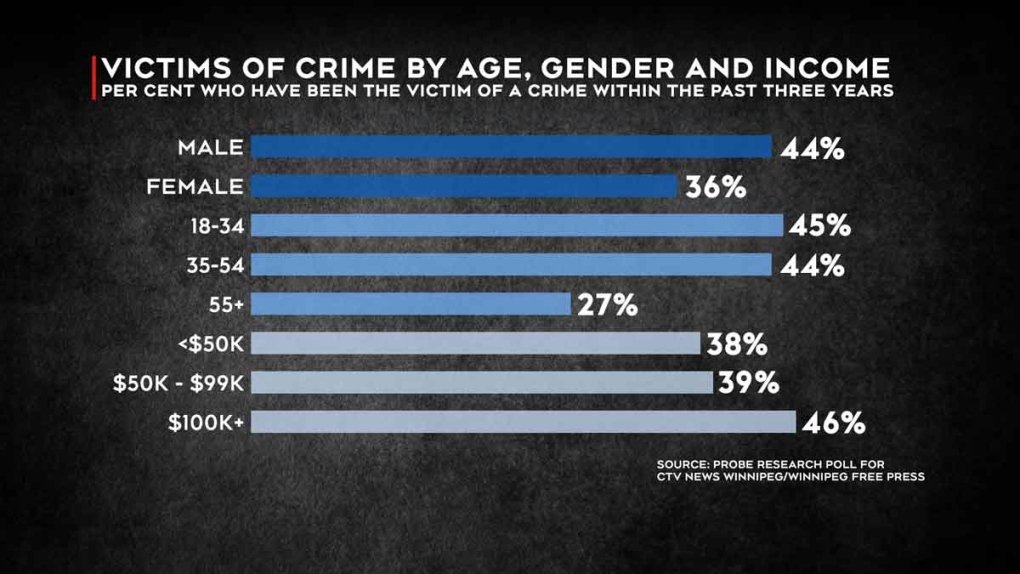
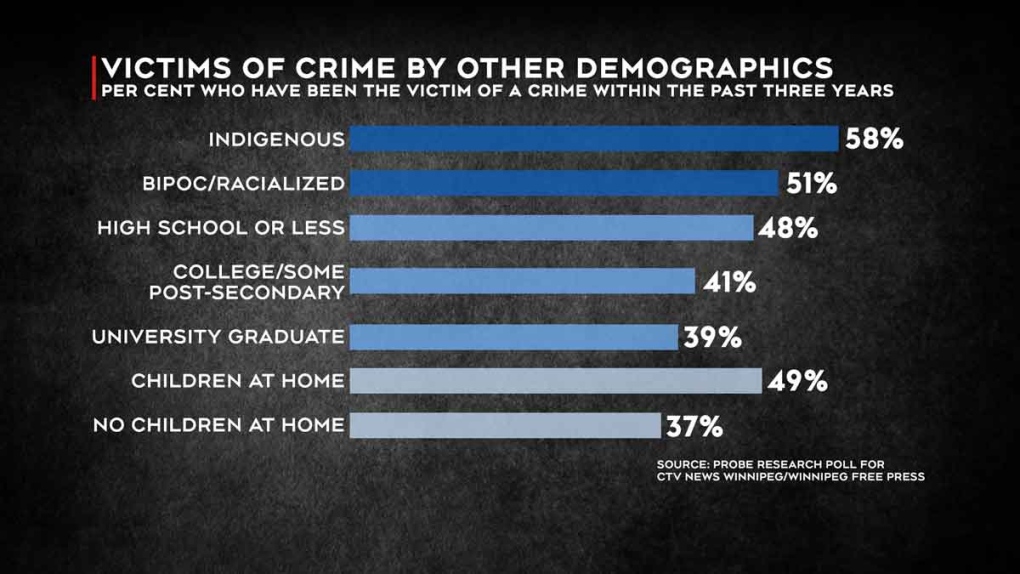
The polling also found 58 per cent of respondents who identified as Indigenous, and 51 per cent who identified as BIPOC or a racialized individual have been victimized by crime.
Bourbonniere said those results don't surprise him.
"It doesn't surprise me that folks that are overrepresented as vulnerable are the victims of crime," he said. "The folks that are living as vulnerable are open to violence, and that type of thing that happened at the street level."
ADDICTION SERVICES A 'PRIMARY FOCUS' IN DEALING WITH CRIME: PREMIER
This comes as the city nears a grim record. According to police, 41 people have become victims of homicide in Winnipeg. With three months left in the year, the city is nearing the 2019 record of 44 homicides.
"There has been a general rise in levels of violence that we really haven't seen before," Jay Murray, a public information officer with the Winnipeg Police Service, told reporters earlier this week.
"That in turn has translated into a higher homicide count."
In speaking to CTV's Nicole Dubé on Tuesday, Premier Heather Stefanson said the province is looking and learning from what other jurisdictions are doing to deal with crime.
"What we want, obviously, at the end of the day, is to make sure that our streets and our neighbourhoods are safe for Manitoba families," Stefanson said.
"This is not something to be swept under the carpet. This is not something that should be normalized. This is very serious. And we are taking measures, we have taken some measures so far."
Pointing to the province's five-year action plan, Stefanson said more support for Manitobans who want to get off addictions is going to be the province's primary focus.
Bourbonniere said all social issues are intertwined and will need a multifaceted approach to deal with.
"If there's an increase in need for mental health, there's often an increase in need for addiction, which does impact safety, it does impact crime, poverty, isolation."
METHODOLOGY
The results from this poll were collected by Probe Research with a random survey of 600 adults living in Winnipeg between September 8 and 18.
Probe Research says, with 95 per cent certainty, the results are within a +/- 4.0 percentage points of what they would have been if the city's entire population was surveyed. It said the margin of error is higher within the survey's population subgroup.
CTVNews.ca Top Stories

Canada Post strike: Union 'extremely disappointed' in latest offer, negotiator says
A negotiator for the Canadian Union of Postal Workers (CUPW) says the latest offer from Canada Post to end the ongoing strike shows the carrier is moving in the "opposite direction."
An archbishop's knock formally restores Notre Dame to life as winds howl and heads of state look on
France's iconic Notre Dame Cathedral is formally reopening its doors on Saturday for the first time since a devastating fire nearly destroyed the 861-year-old landmark in 2019.
Canada's air force took video of object shot down over Yukon, updated image released
The Canadian military has released more details and an updated image of the unidentified object shot down over Canada's Yukon territory in February 2023.
Invasive species could be hiding in your Christmas decor. Here's how to stop the spread
Make sure to look through your holiday decorations, as Christmas trees, wreaths, and other natural decor can have invasive insects, eggs, and plants that pose a threat to local ecosystems and the economy.
Sask. doctor facing professional charges in circumcision case
A Saskatoon doctor has been accused of unprofessional conduct following a high-cost adult circumcision that included a request for the patient to text unsecured post-op pictures of his genitals.
Quebec City bus driver arrested for drunk-driving after collision
A Réseau de transport de la capitale (RTC) bus driver has been arrested for driving under the influence of alcohol after being involved in a collision in Quebec City late Friday evening.
A legacy of valor: Only 16 Pearl Harbor survivors remain. On the 83rd anniversary, they still share stories of heroism
On Saturday, thousands will gather on the shores of Pearl Harbor for the 83rd anniversary of the bombing. There are Only 16 survivors who are still alive.
Why finding the suspected CEO killer is harder than you might think
He killed a high-profile CEO on a sidewalk in America’s largest city, where thousands of surveillance cameras monitor millions of people every day.
Syrian insurgents reach the capital's suburbs. Worried residents flee and stock up on supplies
Insurgents' stunning march across Syria gained speed on Saturday with news that they had reached the suburbs of the capital and with the government forced to deny rumors that President Bashar Assad had fled the country.

































